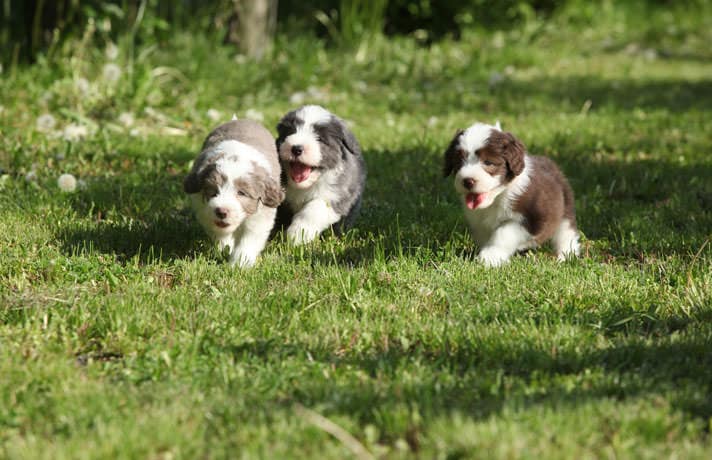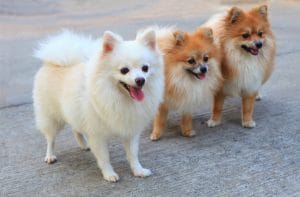Coughing is a common problem in dogs, and it is even more common in puppies. Most of the time abnormal coughing in puppies is caused by “kennel cough.” What is kennel cough, you ask? Kennel cough is a rather vague description for a cough due to an infection. The infectious agent can be a bacterium or a virus. The most common bacteria to cause it are Bordetella and mycoplasma. The common viruses to cause it are the canine adenovirus type 2, canine parainfluenza and canine respiratory coronavirus. Frequently, a combination of a bacterium and a virus is involved. A more accurate description of this complicated infection would be canine infectious tracheobronchitis.
Kennel cough is a highly contagious disease and very easy to spread to puppies, unvaccinated adult dogs and old dogs. Puppies have an immature immune system, which makes them a high-risk population for this disease. Unfortunately, it is also very common disease. I usually see at least one case each week at the clinic. On some days we see several cases of kennel cough.
Puppies and dogs are at high risk of infection when they are exposed to other dogs. Places where a lot of puppies and dogs come in close contact with each other, such as boarding kennels, breeding kennels, dog parks, grooming salons, doggy daycare centers and puppy training classes, are common sites for exposure to the infectious agents of kennel cough.
Symptoms Of Kennel Cough
The time from exposure to the infectious agents to when the puppy starts showing signs of illness is called the incubation period. The incubation period can vary with kennel cough, but it is typically three to 10 days.
Puppies with kennel cough normally develop a loud and frequent cough. This is normally a dry and non-productive cough, which means no mucus is brought up during the coughing. It is also common for the puppy to gag after coughing. Sometimes a small amount of white foamy liquid is spit out after gagging. A clear liquid nasal discharge is occasionally seen, and some pups will have an eye discharge that is full of mucus. They may have a slight fever, but frequently their temperature is in the normal range. Most puppies are still active, but they are not as hyperactive as normal. Most of the time they are still eating some of their dog food but not as much as they would normally eat.
Diagnosing Kennel Cough
How does a veterinarian diagnose a case of kennel cough? Your veterinarian will perform a physical exam and take a history of previous vaccinations and any exposure to other puppies and dogs. Kennel cough is usually diagnosed based on the exam, above symptoms and recent exposure to other dogs. Comprehensive bloodwork and chest radiographs (X-rays) are not normally needed. Likewise, trying to culture which bacterium is in the upper respiratory tract or testing to see which virus is involved is not routinely done.
Kennel Cough Treatment
How does a veterinarian treat kennel cough? Your veterinarian will treat the puppy based on the clinical signs. In most cases an antibiotic and a cough suppressant are used. Which antibiotic is the best one to use? Bordetella is the most common bacterium that causes kennel cough, so the antibiotic needs to be effective against Bordetella. Commonly used antibiotics to treat Bordetella include doxycycline, amoxicillin with clavulanic acid, trimethoprim-sulfa and enrofloxacin. Will amoxicillin treat kennel cough? Yes, amoxicillin or doxycycline are the antibiotics I use in most kennel cough cases. Doxycycline is also a good choice to treat cases involving mycoplasma. In some chronic cases anti-inflammatories (like cortisone or an NSAID) may be used to reduce the inflammation in the trachea. This will help break the cough cycle. Bronchodilators, nebulizers, fluid therapy and supplemental feeding are sometimes needed in more severe cases.
Outlook For Puppies With Kennel Cough
How long does kennel cough last? Fortunately, most cases of kennel cough are mild and typically resolve in two to three weeks. A few cases, especially those involving mycoplasma, may take four to six weeks to resolve. A few cases are so mild that your veterinarian may not use an antibiotic. On the other hand, if your puppy does not improve or if he gets worse, then you will need to return to your veterinarian.
Kennel cough can sometimes progress into pneumonia, which will require a more aggressive treatment plan.
Unfortunately, some cases of distemper and canine influenza (dog flu) can look just like kennel cough in the early stages. Distemper and influenza are serious and potentially fatal viruses, and they could be the reason a puppy does not improve. Your veterinarian will look for signs of these two life-threatening viruses if the puppy does not improve with the routine treatment for kennel cough.
Preventing Kennel Cough
It is always better to prevent an illness than to treat an illness. To prevent kennel cough, keep your puppy from being exposed to other dogs, especially at boarding kennels, grooming salons, dog parks, doggy daycare centers and puppy training classes. Most veterinarians will recommend vaccinating your puppy before exposure to those high-risk areas. Three different types of vaccines are available for kennel cough.
Injectable vaccines for kennel cough have been available for a long time. Most of these vaccines protect against Bordetella, parainfluenza virus and adenovirus. These products typically require two doses given roughly three weeks apart. They work by stimulating the immune system to produce antibodies. Protection develops approximately seven days after the second dose of the vaccine.
Intranasal vaccines are liquids that are squirted into the nose. Some of these products require just one dose to offer protection against Bordetella and parainfluenza. Time frames for the vaccine to go into effect vary, but I believe protection takes approximately five to seven days to develop after the vaccine is given.
An intraoral vaccine is the fairly new option. This requires just a small amount of liquid to be squirted into the puppy’s mouth. This vaccine only protects against Bordetella. This product needs just one dose. Again, time frames for effectiveness vary, but I believe protection occurs roughly seven days from when the vaccine is given. Both the intranasal and intraoral vaccines produce local immunity in the nose and throat.
Kennel Cough Vaccine Side Effects
Unfortunately, none of the kennel cough vaccines are 100 percent effective in preventing kennel cough. Remember, a lot of bacteria and viruses can cause kennel cough, and there is no vaccine against all of the infectious agents.
Side effects from the kennel cough vaccines are not very common and are usually mild in nature. Possible side effects from the injectable vaccines include soreness at the injection site, lethargy, an allergic reaction to the vaccine or an anaphylactic reaction to the vaccine. The intranasal products may produce some mild sneezing, lethargy and a clear liquid nasal discharge that may last for a few days. The intraoral product may produce some lethargy on the day the vaccine is giving.
Another potential problem could develop if the intranasal or intraoral vaccine is accidentally given by injection. This can cause kennel cough from the Bordetella in the vaccine and needs to be treated with an appropriate antibiotic like doxycycline and an anti-inflammatory medicine right away.
Dr. Jerry Murray graduated from Texas A&M’s College of Veterinary Medicine in 1991. He has been in private practice working with small animals and exotic pets for the past 23.5 years. He currently practices in a suburb of Dallas, Texas. When he is not working, Dr. Murray enjoys sports, traveling, wildlife photography and helping with the endangered black-footed ferrets in South Dakota.
Share:









